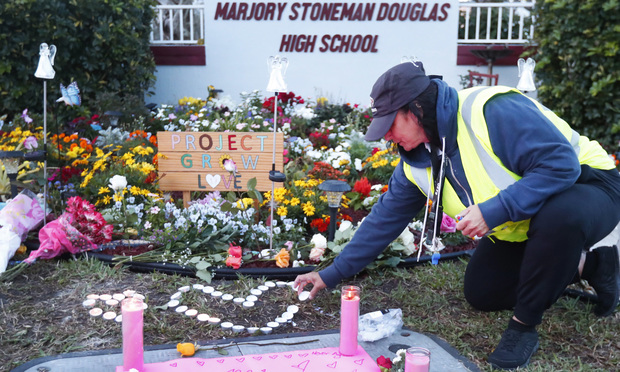FBI in Hot Seat Over Parkland School Shooting as Lawsuit Survives Dismissal Attempt
The plaintiffs have a unique argument in their toolbox. They point to a rare public statement the FBI made after the Parkland school shooting, conceding that it hadn't followed up on tips about shooter Nikolas Cruz's suspicious behavior.
March 11, 2020 at 04:31 PM
5 minute read
 School crossing guard Wendy Behrend lights a candle at a memorial outside Marjory Stoneman Douglas High School during the one-year anniversary of the school shooting. Photo: Wilfredo Lee/AP.
School crossing guard Wendy Behrend lights a candle at a memorial outside Marjory Stoneman Douglas High School during the one-year anniversary of the school shooting. Photo: Wilfredo Lee/AP.
A lawsuit from the parents of victims of the February 2018 Parkland school shooting has passed its first major hurdle in the Southern District of Florida, where U.S. District Judge William P. Dimitrouleas had harsh words for the government.
The suit will test the limits of the FBI's duty to follow up on tips.
The judge criticized the FBI for withholding relevant documents, remarking that discovery has taken "much longer than the court anticipated." He noted the FBI claimed a discovery order covering anything related to how the bureau valuates, assesses, handles or investigates leads was too broad, and would take "perhaps even years" to fulfill.
"The court finds the United States' contorted arguments regarding its exceedingly narrow and unfounded interpretations of the court's discovery orders to be frivolous," Dimitrouleas wrote.
Podhurst Orseck attorneys Kristina Infante, Steven C. Marks and Pablo Rojas represent Frederic and Jennifer Guttenberg, whose 14-year-old daughter Jaime Guttenberg was one of 17 people killed Feb. 14, 2018, when shooter Nikolas Cruz stormed into Marjory Stoneman Douglas High School.
'He's going to explode'
The Guttenbergs argue the FBI failed their daughter by not acting on two tips from people worried about Cruz's behavior.
"I know he's going to explode," one of Cruz's family friends reportedly told the FBI in January 2018, according to court filings. The caller had worried Cruz would "slip into a school and start shooting the place up" after he'd been kicked out of school and started collecting weapons, according to the Guttenberg's lawsuit.
Another tipster had called in late 2017 about a comment Cruz wrote on a YouTube channel about becoming a school shooter.
Related story: Parkland Shooter Recorded Himself Plotting School Massacre
The Guttenbergs filed suit under the Federal Tort Claims Act discretionary function exception, which waives the government's sovereign immunity in ordinary negligence cases.
Their negligence suit was the first of dozens filed over the callers' tips to law enforcement, and the first to reach the motion-to-dismiss stage. It's consolidated with a similar complaint from Philip and April Schentrup, whose daughter Carmen Schentrup was killed. Attorney Robert Stein of Rennert Vogel Mandler & Rodriguez represents that family.
The government asked the court to throw out the lawsuit. It argued the complaint fell under an exception that bars claims involving employee who act within their own discretion rather than adhering to a "fixed or readily ascertainable standard." It suggested bureau staff had used their own discretion to determine how to respond to the tips.
But Dimitrouleas declined to throw out the case, allowing attorneys to conduct discovery before the defense can raise that claim again.
Admission of negligence?
The plaintiffs have a unique argument in their toolbox. They point to a rare public statement the FBI released two days after the shooting, conceding that it hadn't followed up on tips.
"Under established protocols, the information provided by the caller should have been assessed as a potential threat to life," the FBI statement said. "The information then should have been forwarded to the FBI Miami Field Office, where appropriate investigative steps would have been taken."
That, the plaintiff claims, was an admission of negligence.
When compelling discovery earlier in the case, U.S. Magistrate Judge Lurana Snow had said the significance of that public admission—the first she'd seen from a federal agency in more than 30 years—"cannot be overstated."
"Having first issued a statement of remarkable apparent candor, the defendant has responded to the plaintiffs' reasonable discovery requests in a manner far less candid," Snow found.
 Kristina Infante of Podhurst Orseck in Miami. Courtesy photo.
Kristina Infante of Podhurst Orseck in Miami. Courtesy photo.Carlos Javier Raurell of the U.S. Attorney's Office in Miami and Paul David Stern of the U.S. Department of Justice represent the government. Their offices did not respond to a request for comment by deadline.
The plaintiffs will now seek to find out who made the decision not to act on information about Cruz, and when and how that person reached the conclusion.
Meanwhile, plaintiffS counsel Infante said she was pleased with the ruling and looks forward to continuing with the litigation.
"Our clients suffered an unimaginable loss," Infante said. "Their hope is that our efforts in this litigation will prevent similar tragedies in the future."
The next hurdle for the plaintiffs: overcoming the government's claims that it owed no duty of care to the students under Florida law, which dictates—with exceptions—that defendants aren't responsible for the crimes of a third party.
Read the ruling:
Read more:
This content has been archived. It is available through our partners, LexisNexis® and Bloomberg Law.
To view this content, please continue to their sites.
Not a Lexis Subscriber?
Subscribe Now
Not a Bloomberg Law Subscriber?
Subscribe Now
NOT FOR REPRINT
© 2025 ALM Global, LLC, All Rights Reserved. Request academic re-use from www.copyright.com. All other uses, submit a request to [email protected]. For more information visit Asset & Logo Licensing.
You Might Like
View All
Greenberg Traurig Combines Digital Infrastructure and Real Estate Groups, Anticipating Uptick in Demand
4 minute read
US Judge Cannon Blocks DOJ From Releasing Final Report in Trump Documents Probe
3 minute read
As Unpredictability Rises, Gov't Law Practices Expect Trump Bump. Especially in Florida
5 minute readLaw Firms Mentioned
Trending Stories
- 1The New Rules of AI: Part 2—Designing and Implementing Governance Programs
- 2Plaintiffs Attorneys Awarded $113K on $1 Judgment in Noise Ordinance Dispute
- 3As Litigation Finance Industry Matures, Links With Insurance Tighten
- 4The Gold Standard: Remembering Judge Jeffrey Alker Meyer
- 5NJ Supreme Court Clarifies Affidavit of Merit Requirement for Doctor With Dual Specialties
Who Got The Work
J. Brugh Lower of Gibbons has entered an appearance for industrial equipment supplier Devco Corporation in a pending trademark infringement lawsuit. The suit, accusing the defendant of selling knock-off Graco products, was filed Dec. 18 in New Jersey District Court by Rivkin Radler on behalf of Graco Inc. and Graco Minnesota. The case, assigned to U.S. District Judge Zahid N. Quraishi, is 3:24-cv-11294, Graco Inc. et al v. Devco Corporation.
Who Got The Work
Rebecca Maller-Stein and Kent A. Yalowitz of Arnold & Porter Kaye Scholer have entered their appearances for Hanaco Venture Capital and its executives, Lior Prosor and David Frankel, in a pending securities lawsuit. The action, filed on Dec. 24 in New York Southern District Court by Zell, Aron & Co. on behalf of Goldeneye Advisors, accuses the defendants of negligently and fraudulently managing the plaintiff's $1 million investment. The case, assigned to U.S. District Judge Vernon S. Broderick, is 1:24-cv-09918, Goldeneye Advisors, LLC v. Hanaco Venture Capital, Ltd. et al.
Who Got The Work
Attorneys from A&O Shearman has stepped in as defense counsel for Toronto-Dominion Bank and other defendants in a pending securities class action. The suit, filed Dec. 11 in New York Southern District Court by Bleichmar Fonti & Auld, accuses the defendants of concealing the bank's 'pervasive' deficiencies in regards to its compliance with the Bank Secrecy Act and the quality of its anti-money laundering controls. The case, assigned to U.S. District Judge Arun Subramanian, is 1:24-cv-09445, Gonzalez v. The Toronto-Dominion Bank et al.
Who Got The Work
Crown Castle International, a Pennsylvania company providing shared communications infrastructure, has turned to Luke D. Wolf of Gordon Rees Scully Mansukhani to fend off a pending breach-of-contract lawsuit. The court action, filed Nov. 25 in Michigan Eastern District Court by Hooper Hathaway PC on behalf of The Town Residences LLC, accuses Crown Castle of failing to transfer approximately $30,000 in utility payments from T-Mobile in breach of a roof-top lease and assignment agreement. The case, assigned to U.S. District Judge Susan K. Declercq, is 2:24-cv-13131, The Town Residences LLC v. T-Mobile US, Inc. et al.
Who Got The Work
Wilfred P. Coronato and Daniel M. Schwartz of McCarter & English have stepped in as defense counsel to Electrolux Home Products Inc. in a pending product liability lawsuit. The court action, filed Nov. 26 in New York Eastern District Court by Poulos Lopiccolo PC and Nagel Rice LLP on behalf of David Stern, alleges that the defendant's refrigerators’ drawers and shelving repeatedly break and fall apart within months after purchase. The case, assigned to U.S. District Judge Joan M. Azrack, is 2:24-cv-08204, Stern v. Electrolux Home Products, Inc.
Featured Firms
Law Offices of Gary Martin Hays & Associates, P.C.
(470) 294-1674
Law Offices of Mark E. Salomone
(857) 444-6468
Smith & Hassler
(713) 739-1250







